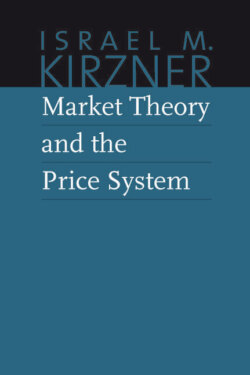Читать книгу Market Theory and the Price System - Israel M. Kirzner - Страница 33
На сайте Литреса книга снята с продажи.
THE ECONOMIC PROBLEM
ОглавлениеSocial phenomena can be examined from two distinct points of view. First of all, they can be examined merely positively. Chains of cause and effect can be proved to exist; the likely effects of particular changes can be foretold; the probable responsibility of particular prior events for definite current phenomena can be explained. Social phenomena, however, can be examined in addition from a normative point of view. The way prior causes bring about subsequent events can be judged by the success with which the process fulfills definite goals (believed by the investigator to be cherished by someone concerned with the usefulness of the process). A breakdown in a commuter bus service may be seen positively as responsible for highways swarming with an unusual number of private cars. It may be “blamed”—normatively—for the inconvenience experienced by those who use the bus service for a convenient means of transportation.
The economic theorist, too, is able to view his subject matter from both these perspectives. He may simply trace through the operation of market forces. Or he may, in addition, appraise the market from the perspective of one or other aspects of the “economic problem.” Although the concept of an economic problem is most frequently discussed with respect to an entire society, the idea is fundamentally one relating to the individual. For an individual, the economic problem consists in ensuring that the resources at his disposal be utilized in the most effective manner possible—from the point of view of the goals which he has set up. Successful solution of this economic problem requires that the individual apportion resources to promote his various adopted goals in a pattern that will faithfully reflect the hierarchy of importance to him of the various goals. If he desires goal A more urgently than goal B, and the available resources are insufficient for both goals, a “correct” solution of the economic problem requires that he allocate his resources to A rather than to B; and so on.
From the perspective defined by the goal of correctly solving his economic problem, an individual may judge his actions as being either efficient or otherwise. From the point of view of his own chosen goals, considering the varying degrees of urgency that he has assigned to these goals, the individual may frown at a particular course of action as being at variance with his goal program. Such a course of action is “inefficient,” “wasteful,” and “irrational”; it fails to aim at the most important of the chosen goals.
The goal of “efficiency” is not really a separate goal in its own right. Efficiency is nothing else, in the present context, than the consistent pursuit of other goals. Consistency in the pursuit of goals calls for a refusal to apply resources to achieve one goal when this implies forsaking a still more highly cherished goal. Inefficiency is thus synonymous with inconsistency. An inefficient course of action is one that is inconsistent with a given program of goals. A course of action that is inefficient with respect to one set of goals may be highly efficient with respect to a different set. But the point is that, in making plans, individuals have in mind given sets of goals. With respect to this set of goals, they seek a consistent, efficient course of action.
